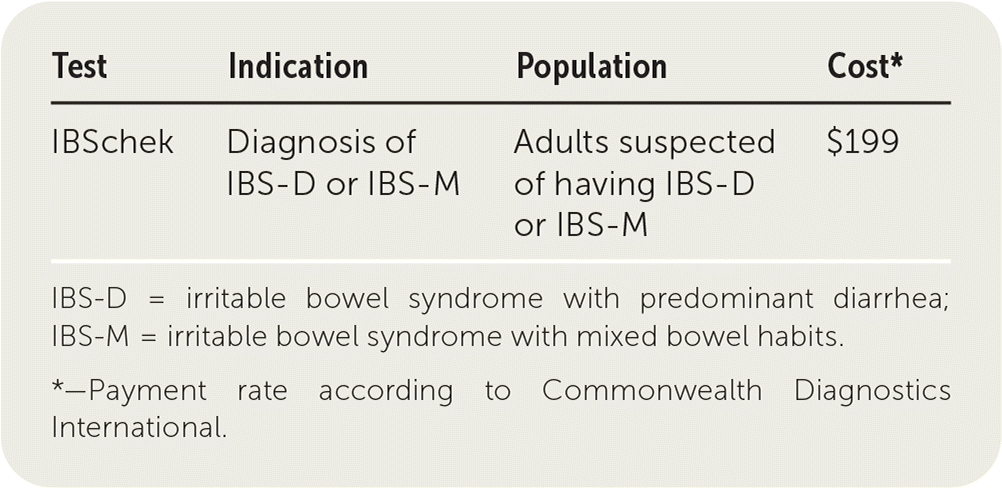
Am Fam Physician. 2020;101(9):564-565
Author disclosure: No relevant financial affiliations.
IBSchek is a blood test marketed to assist in the diagnosis of irritable bowel syndrome with predominant diarrhea (IBS-D) or with mixed bowel habits (IBS-M) in adults.

| Test | Indication | Population | Cost* |
|---|---|---|---|
| IBSchek | Diagnosis of IBS-D or IBS-M | Adults suspected of having IBS-D or IBS-M | $199 |
Accuracy
The diagnosis of IBS-D or IBS-M is made using Rome IV criteria, which include the presence of certain symptoms, the absence of alarm symptoms, and negative screening blood test results (complete blood count, C-reactive protein, fecal calprotectin, and celiac serologies).1,2 The type of IBS is categorized based on the predominant type of stool using the Bristol stool scale: IBS-D, IBS with predominant constipation, IBS-M, and IBS unclassified.
IBSchek detects antibodies against cy tolethal distending toxin B (anti-CdtB) and the cell adhesion protein vinculin (antivinculin). These serum biomarkers are thought to be involved in the pathophysiology of postinfectious IBS.3 Studies have demonstrated a six- to sevenfold increase in the odds of developing IBS after an episode of gastroenteritis.4,5
The initial study of these biomarkers included 2,681 adults between 18 and 65 years of age. Of these participants, 2,375 had IBS-D using Rome III criteria, 121 had celiac disease, 142 had inflammatory bowel disease, and 43 were healthy. Anti-CdtB optical densities were highest in patients with IBS-D (2.53 ± 0.69). Patients with IBS-D were differentiated from those with inflammatory bowel disease using an anti-CdtB optical density of 2.80 or greater (specificity = 91.6%; sensitivity = 43.7%; positive likelihood ratio [LR+] = 5.2; negative likelihood ratio [LR−] = 0.6) or an antivinculin optimal density of 1.68 or greater (specificity = 83.8%; sensitivity = 32.6%; LR+ = 2.0; LR− = 0.8).3 An additional study using Rome III criteria also showed that patients with IBS-D or IBS-M have high positivity rates of these biomarkers when compared with healthy patients.6 However, these case-control studies overestimate true test accuracy.
Benefit
The manufacturer recommends using IBSchek to assist with the diagnosis of postinfectious IBS and in the assessment of patients with persistent symptoms consistent with IBS despite negative results on the limited screening tests described in the Rome IV criteria. However, no prospective data on diagnostic accuracy support these indications. There is also no evidence that the test improves disease management or patient-oriented outcomes.
Harms
Because of low test sensitivity, a negative result on IBSchek cannot rule out IBS-D and IBS-M. Use of this test may be challenging in some practices because it is performed only in one laboratory. Finally, patients with comorbidities commonly seen in primary care (HIV, history of diabetes mellitus, known pancreatic disease, unstable thyroid disease, chronic opioid use, bowel surgeries except cholecystectomy, and appendectomy) were excluded during initial validation of the test, raising concerns about its generalizability to these populations.
Cost
Bottom Line
Preliminary data from studies with suboptimal designs suggest that IBSchek may have promise in the diagnosis of IBS-D and IBS-M, particularly in patients with suspected postinfectious IBS. Until further studies are performed, however, there is insufficient evidence to recommend the use of this test in clinical practice.
